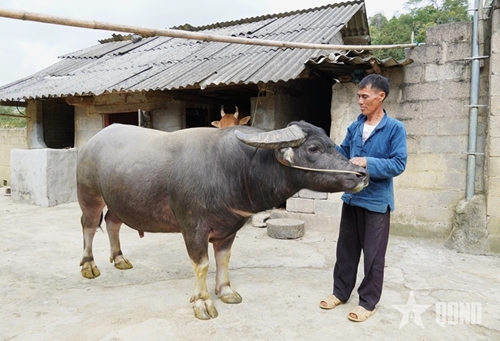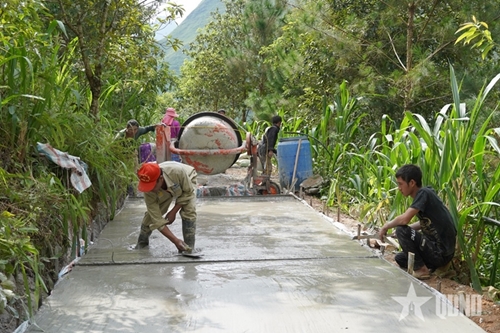Son Vi is a newly established administrative unit, formed by the merger of three former border communes with extremely difficult conditions, namely Thuong Phung, Son Vi, and Xin Cai. Nearly 100% of its population belongs to ethnic minority groups, and living conditions remain challenging. However, under the leadership of the Party committees, the joint efforts of authorities at all level and the border guard force, the commune is gradually transforming step by step.
    |
 |
|
From a needy household, Vu Chua Xa in Mo Phang village, Son Vi commune has risen to become a typical family in developing livestock farming. |
Previously, the family of Gia Mi Sinh from Tra Man village lived in a temporary house. On stormy nights, the whole family lived in constant fear that the house might collapse. However, currently, thanks to the support of a program to eliminate dilapidated and temporary housing, along with the contribution of local authorities, armed forces, and local people, his family live in a solid home.
Apart from Sinh’s family, over the past five years, more than 600 houses for poor households have been built across Son Vi commune. Each house is not only a place to live, but also serves as a fulcrum for families to settle down, stay rooted in their hometown to protect the village, contributing to the protection of national border sovereignty.
The journey out of poverty in Son Vi doesn’t stop at housing. It is also being fueled by a shift in production. On the rocky mountain slopes, livestock models involving buffalo and cattle, along with the clearing land for planting trees, have yielded remarkable results.
    |
 |
|
Concrete roads have made travel more convenient for people in Son Vi commune, paving the way toward sustainable poverty alleviation. |
In villages such as Mo Phang, Tong Quang Trai, and Xa Phin, the formation of cooperative groups has helped local people gradually transition from small-scale farming to more organized production models. These include the integration of vegetable cultivation, fruit tree planting, and raising cattle and pigs. In just a short time, dozens of households have escaped poverty, creating a positive ripple effect in the movement toward sustainable poverty reduction.
On Son Vi’s journey to poverty reduction, rural transportation infrastructure plays a vital role in connecting production and residential areas, bringing goods, services, and development opportunities closer to communities in the highland. Thanks to resources from national target programs and the joint efforts of many forces, dozens of kilometers of inter-village roads in the commune have now been paved with concrete, making the transport of agricultural products safer and more convenient during stormy weather. With the concrete roads, local people’s life has been improved, laying a foundation for them to expand production, develop livelihoods, and better connect with markets.
Once facing hardships, Son Vi today is rising with its own internal strengths and entering a new phase of stable, sustainable, and comprehensive development. Along the Fatherland’s border, people’s hearts are aligned with the Party’s will, and the aspiration to build a prosperous and renewed homeland is continuously promoted.
Translated by Quynh Oanh